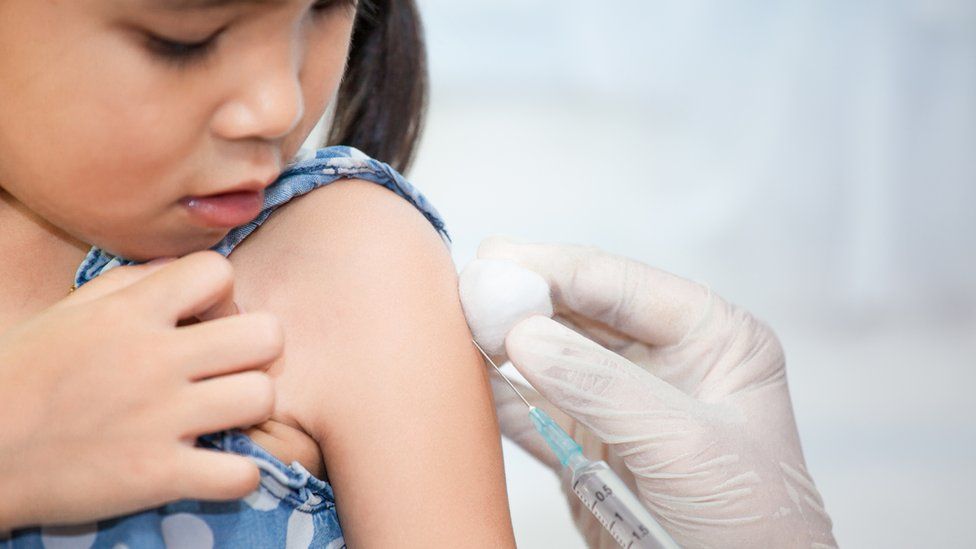Alarm as uptake drops for all routine child jabs
- Published

Coverage for all the routine childhood vaccinations for the under-fives has fallen in the past year, figures show.
NHS data for 2018-19 showed uptake of the first dose of the MMR vaccine fell from 91.2% to 90.3% in England - the fifth year in a row it has dropped.
There are 10 vaccines given in total, providing protection against diseases such as tetanus, polio and meningitis.
Health officials warned that children were being put at risk by the decision to shun these routine vaccinations.
Public Health England's head of immunisations Dr Mary Ramsay said while the percentage changes might seem small, the impact should not be underestimated.
"There are big drops in terms of public health. The trend is concerning.
"No parent should be in any doubt of the devastating impact of these diseases.
"It's vital that everyone recognises the value of vaccines and takes up this life-saving offer."
The measles problem
Jilly Moss's one-year-old daughter contracted measles weeks before she was due to be vaccinated
It was announced last month that the UK had lost its World Health Organization measles-free status, three years after the virus was eliminated.
During 2018 there were nearly 1,000 cases - more than double the number in 2016.
Cases of mumps have shown a similar trend.
MMR is given in two doses - one just after a child's first birthday and then a second dose before school.
The target is for 95% uptake as that is the level at which herd immunity is achieved, which means the disease cannot circulate because of the high levels of protection.
No part of England is achieving the 95% target for the first dose, with all regions seeing a fall in the past year with the exception of the North East.
Coverage rates for the second dose are also dropping - down from 87.2% in 2017-18 to 86.4% in 2018-19.
However, Northern Ireland and Scotland are seeing vaccination rates above 95% for the first dose. Wales is not.
The BBC investigated in 2018 why there's been a measles outbreak in Europe
Other countries are also struggling with the disease - globally the number of cases nearly tripled in the first seven months of the year compared with the same period in 2018.
Measles is now endemic in a number of countries, including France, Germany and Italy.
What action is being taken?
Health Secretary Matt Hancock said the situation was "unacceptable".
"Everyone has a role to play in halting this decline.
"The loss of our measles-free status is a stark reminder that devastating diseases can, and will, resurface.
"We need to be bold and I will not rule out action so that every child is properly protected."
The idea of compulsory vaccination has been put forward and is under consideration.
But so far, the government has focused on working with social media companies to make sure misleading anti-vaccine messages are quashed and getting GPs to promote catch-up vaccinations for children.
What about the other vaccines?
Alongside the two MMR doses there are another eight vaccines that children currently get as part of the routine programme.
One - the Men B booster - was only introduced this year so there is no comparable data for previous years for that.
Of the remaining seven, all have seen a drop in uptake over the past year.
They are:
- Five-in-one for diphtheria, tetanus, whooping cough, polio and Hib (a new six-in one jab including hepatitis B is being rolled out)
- Five-in-one for diphtheria, tetanus, whooping cough, polio and Hib booster (a new six-in one jab including hepatitis B is being rolled out)
- Pneumococcal disease
- Pneumococcal disease booster
- Rotavirus
- Meningococcal group B
- Hib/Meningococcal group C
The coverage of the five-in-one vaccine by a baby's first birthday is at its lowest rate for 10 years at 92.1%. It has fallen for six consecutive years.
Why is this happening?
Prof Jonathan Ball, of the University of Nottingham, said the reasons for the falls across the routine programme are "complex".
"Some of it is down to misinformation of vaccine dangers that still do the circuit on social media and some communities and groups of people have consistently been difficult to engage with.
"But I suspect that much of it is down to the fact that we have forgotten just how serious these infections can be and have started to think of them as simply trivial childhood infections.
"We all lead busy lives and it might be tempting to put off a trip to the GPs for convenience's sake. But the importance of getting our children immunised can not be overstated."
Have you chosen not to vaccinate your child? You can get in touch with us by emailing haveyoursay@bbc.co.uk.
Please include a contact number if you are willing to speak to a BBC journalist. You can also contact us in the following ways:
- WhatsApp: +44 7756 165803
- Tweet: @BBC_HaveYourSay
- Send pictures/video to yourpics@bbc.co.uk
- Upload your pictures / video here
- Text an SMS or MMS to 61124 or +44 7624 800 100
- Please read our terms of use and privacy policy
- Published20 September 2017
- Published27 September 2017
- Published2 May 2013
- Published19 April 2013